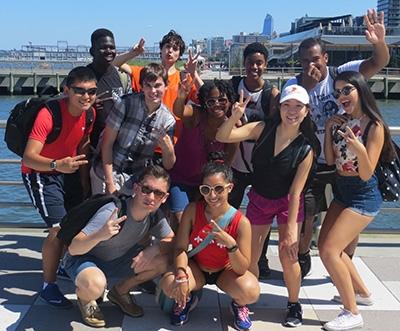
When Laura Peña ’19 arrived at Princeton, she thought everyone was “a genius who had it all together.” Despite her stellar high school grades, she felt like an impostor and worried that maybe she didn’t really belong at the University. “If you’re from a background like mine, lower income and first generation, sometimes you wonder, ‘Am I a statistic or am I here because someone sees something in me?’” said Peña, who is from Elizabeth, New Jersey.
Princeton’s Freshman Scholars Institute (FSI), a seven-week summer program for about 80 incoming Princetonians, helped Peña begin to work through those feelings, prepare for Princeton’s rigorous curriculum, and settle into her new home. FSI students are selected based on a variety of criteria, including their academic achievements as first-generation college students, demonstrated leadership and mentorship skills, and their clear commitment to scholarly inquiry.
One of the driving forces behind FSI is Nimisha Barton *14, the program’s associate director. The first in her family to attend college, Barton can identify with the challenges many of the FSI students face.
Barton had been an outstanding student in college, but when she came to Princeton for her PhD in history, she felt “lost.” It wasn’t until she discovered FSI as a fifth-year graduate student that she came to understand what it meant to have a different level of preparation for the academic expectations at Princeton and was able to articulate “the extreme cultural mismatch I was experiencing.”
She got involved planning social events and became a sort of big sister to the FSI scholars. “I felt like I had found my people,” says Barton.
In subsequent summers she helped students in the Writing Center and taught FSI’s humanities course, “Ways of Knowing,” which all scholars take; she became associate director last year. “Nimisha takes the time to really talk to us,” says Peña.
In addition to “Ways of Knowing,” FSI scholars take one of three quantitative courses: “Foundations of Engineering,” “Laboratory Research in the Life Sciences” (molecular biology), or “Visualizing Data” (politics). And they learn to navigate the array of educational and extracurricular opportunities available at Princeton.
A Supportive Space

In “Ways of Knowing” Peña developed her analytical reading and writing skills as she was pushed “to dig a lot deeper in the texts,” she said. FSI encouraged her to reach out to her professors throughout the year. As the students studied, socialized, and learned their way around campus, they built a tight-knit community. “We’re there for each other,” says Peña.
FSI Associate Director Nimisha Barton *14 first became involved with the program as a graduate student.
Barton is also there for the scholars. When she learned that one student had a fever, she walked her over to McCosh Health Center, assuring her that the visit would be free. She has helped Peña balance her desire to spend time with her family in Elizabeth with the need to focus on herself and school. “I want to be there for my little brother,” says Peña, “but I want to find myself too.”
Peña, who has decided to major in computer science, can’t get enough of FSI. She returned this summer to serve as a writing teaching assistant. And she is a member of a pilot program, the Scholars Institute Fellows Program, that picks up where FSI leaves off, providing mentorship, social events, and workshops year-round.
Poised to lead
FSI aims to prepare campus leaders. Among Peña’s FSI cohort are the presidents of the sophomore class and J Street U (an advocacy group) and the director of a campus production of the musical In the Heights. “We’ve been empowered with the sense that we belong here, and we’ve been given tools and gained the confidence that help us advance during the year,” says Peña.
At the end of her FSI summer, when Peña watched the rocket she had built in her engineering course soar more than 100 feet in the air above Poe Field, she thought, “I did that! I’m not an impostor.”
To learn how to support college opportunity and access to education at Princeton, contact Jennifer Sachs Dahnert, director of development, principal gifts, at dahnert@princeton.edu or 609.258.8252.


